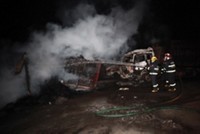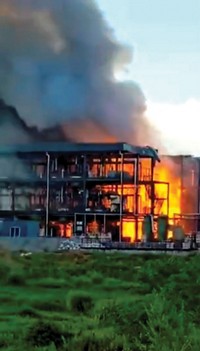Advertisement
Grab your lab coat. Let's get started
Welcome!
Welcome!
Create an account below to get 6 C&EN articles per month, receive newsletters and more - all free.
It seems this is your first time logging in online. Please enter the following information to continue.
As an ACS member you automatically get access to this site. All we need is few more details to create your reading experience.
Not you? Sign in with a different account.
Not you? Sign in with a different account.
ERROR 1
ERROR 1
ERROR 2
ERROR 2
ERROR 2
ERROR 2
ERROR 2
Password and Confirm password must match.
If you have an ACS member number, please enter it here so we can link this account to your membership. (optional)
ERROR 2
ACS values your privacy. By submitting your information, you are gaining access to C&EN and subscribing to our weekly newsletter. We use the information you provide to make your reading experience better, and we will never sell your data to third party members.
Safety
Explosion In Thailand Kills 12
Chemical Safety: Accidents reignite simmering tensions
by Jean-François Tremblay
May 14, 2012
| A version of this story appeared in
Volume 90, Issue 20

Two serious accidents occurred within two days at the Map Ta Phut petrochemical production zone in eastern Thailand.
An explosion on May 5 at a synthetic rubber plant owned by Bangkok Synthetics killed 12 people and injured more than 140 at Map Ta Phut. The next day, a chlorine leak at a hydrochloric acid plant operated by Aditya Birla Chemicals led to the hospitalization of 13 people, according to the Industrial Estate Authority of Thailand (IEAT).
The back-to-back accidents have revived tensions between the facilities in the industrial zone and nearby residents who blame the petrochemical industry for causing pollution and posing a safety risk.
Bangkok Synthetics said in a statement that the explosion occurred when the plant was shut down and undergoing maintenance. During a storm, a fire broke out in a toluene vessel that had just been cleaned, the company said.
“As far as I can remember, this is the most serious accident to occur in the Thai petrochemical industry,” says Samuel Liew, associate director of Asian olefins and elastomers at the Singapore office of IHS Chemical, a market research firm. The death and injury toll was high, he says, because many contractors were at the site performing maintenance duties during the shutdown.
Bangkok Synthetics is a key supplier of polybutadiene and styrene-butadiene rubbers to the well-developed Thai tire industry. The firm has “one of the smallest capacities in Asia, but a great influence on the market,” Liew says. The company has attracted loyal customers with its ability to deliver rubber reliably and on schedule, Liew says. These customers will be struggling to secure supplies in coming months, with the result that rubber prices in Southeast Asia will be higher than elsewhere, Liew predicts.
After the rubber plant explosion, Thai Prime Minister Yingluck Shinawatra ordered improvements in the warning systems that provide residents living near chemical facilities with evacuation information when an accident occurs.
Two years ago, Thai residents opposed to the expansion of the chemical industry at Map Ta Phut succeeded in freezing the construction of all new projects at the industrial estate (C&EN, March 22, 2010, page 26). The two accidents have revived antagonism toward the petrochemical industry.
Suthi Atchasai, the main activist behind the court case that resulted in the moratorium on further construction at Map Ta Phut, is preparing a new lawsuit to demand that buffer zones be created to separate local residents from the hazards of the chemical industry, the Thai news agency MCOT reports.
At a meeting organized by IEAT on May 6, local residents expressed concerns about warning systems and evacuation procedures, the authority reported on its website. The government agency has promised to improve its disaster management procedures.
The controversy is unlikely to affect a synthetic rubber plant being built at Map Ta Phut by a joint venture of Bangkok Synthetics and Japan’s JSR, Liew believes (C&EN, March 7, 2011, page 20). He notes that the venture has already obtained all the permits required by law.




Join the conversation
Contact the reporter
Submit a Letter to the Editor for publication
Engage with us on Twitter